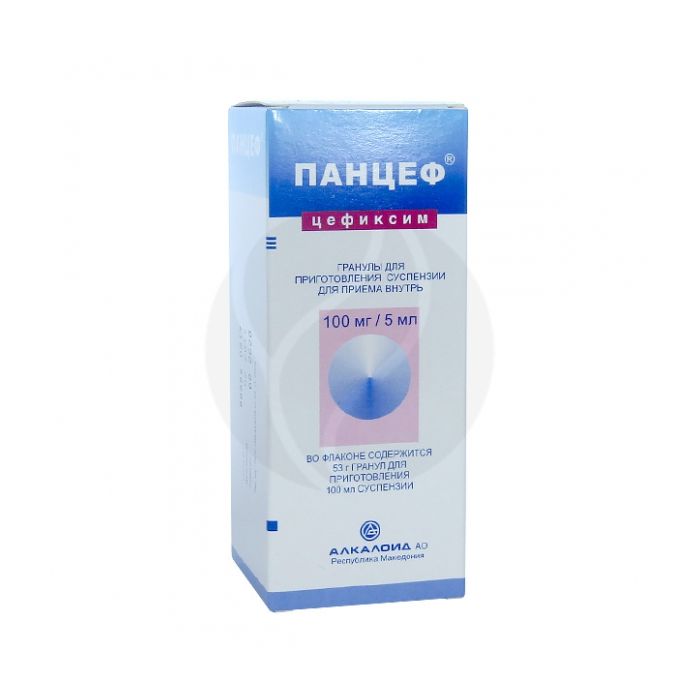Pancef granules for prig. suspension. for oral administration 100mg / 5ml, 53 g
Expiration Date: 05/2027
Russian Pharmacy name:
Панцеф гранулы д/приг. суспенз. д/приема внутрь 100мг/5мл, 53 г
Infectious and inflammatory diseases caused by microorganisms sensitive to cefixime:
upper respiratory tract infections (tonsillitis, pharyngitis, sinusitis);
otitis media;
lower respiratory tract infections (bronchitis, tracheobronchitis);
urinary tract infections;
uncomplicated gonorrhea (urethra and cervix).
The reception mode is individual.
100 ml of suspension contains
active substance:
cefixime (as cefixime trihydrate)
Excipients: sucrose, xanthan gum, sodium benzoate, orange flavor.
Hypersensitivity to cephalosporins, penicillins, penicillamine;
children's age up to 6 months (for suspension)
With care: old age, renal failure, colitis (history).
pharmachologic effect
Semi-synthetic cephalosporin antibiotic of the third generation for oral administration of a wide spectrum of action. It has a bactericidal effect. The mechanism of action is due to the inhibition of the synthesis of the cell membrane of the pathogen. Cefixime is resistant to the action of ?-lactamases produced by most gram-positive and gram-negative bacteria. In vitro, cefixime is active against gram-positive bacteria: Streptococcus agalactiae; gram-negative bacteria: Haemophilus parainfluenzae, Proteus vulgaris, Klebsiella pneumoniae, Klebsiella oxytoca, Pasteurella multocida, Providencia spp., Salmonella spp., Shigella spp., Citrobacter amalonaticus, Citrobacter diversceus. Serratia marcesceus. In vitro and in clinical practice, cefixime is active against gram-positive bacteria: Streptococcus pneumoniae, Streptococcus pyogenes; gram-negative bacteria:Haemophilus influenzae, Moraxella (Branhamella) catarrhalis, Escherichia coli, Proteus mirabilis, Neisseria gonorrhoeae. Pseudomonas spp., Enterococcus (Streptococcus) serogroup D, Listeria monocytogenes, most Staphylococcus spp. Are resistant to cefixime. (including methicillin-resistant strains), Enterobacter spp., Bacteroides fragilis, Clostridium spp.
Pharmacokinetics
When taken orally, the bioavailability of cefixime is 40-50% regardless of food intake, however, the Cmax of cefixime in serum is reached 0.8 hours faster when taking the drug with food. Plasma protein binding, mainly albumin, is 65%. About 50% of the dose is excreted in the urine unchanged within 24 hours, about 10% of the dose is excreted in the bile. T1 / 2 depends on the dose and is 3-4 hours. In patients with impaired renal function with CC from 20 to 40 ml / min, T1 / 2 increases to 6.4 hours, with CC 5-10 ml / min - up to 11.5 hours.
Side effect
From the digestive system: dry mouth, anorexia, diarrhea, nausea, vomiting, abdominal pain, flatulence, transient increase in the activity of hepatic transaminases and alkaline phosphatase, hyperbilirubinemia, jaundice, gastrointestinal candidiasis, dysbiosis; rarely - stomatitis, glossitis, pseudomembranous enterocolitis. From the hematopoietic system: leukopenia, thrombocytopenia, neutropenia, hemolytic anemia. From the side of the central nervous system: dizziness, headache. From the urinary system: interstitial nephritis. Allergic reactions: pruritus, urticaria, flushing of the skin, eosinophilia, fever.
Application during pregnancy and lactation
Use during pregnancy is possible only if the intended benefit to the mother outweighs the potential risk to the fetus. If necessary, use during lactation should stop breastfeeding.
Application for impaired renal function
In case of impaired renal function (with CC from 21 to 60 ml / min) or in patients on hemodialysis, the daily dose should be reduced by 25%. When CC is 20 ml / min, the daily dose should be reduced by 2 times.
Use in elderly patients
It should be used with caution in elderly patients.
special instructions
It should be used with caution in elderly patients, patients with chronic renal failure or pseudomembranous colitis (in history), in children under 6 months of age. With prolonged use, it is possible to disrupt the normal intestinal microflora, which can lead to the growth of Clostridium difficile and cause the development of severe diarrhea and pseudomembranous colitis. In patients with a history of allergic reactions to penicillins, hypersensitivity to cephalosporin antibiotics is possible. During treatment, a positive direct Coombs' reaction and a false positive urine glucose reaction are possible.

